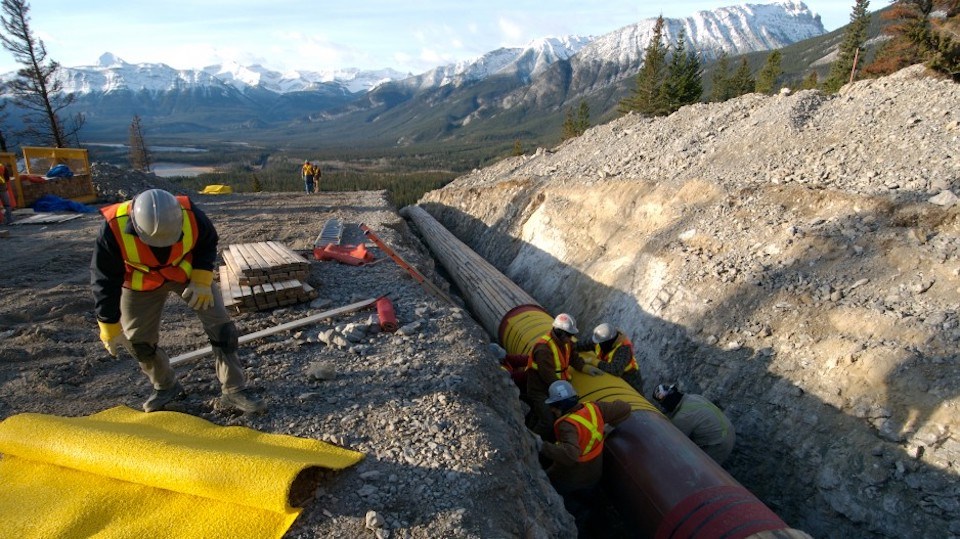The capital cost of completing the twinning of the Trans Mountain pipeline has soared to a whopping $21.4 billion.
The expansion project was last estimated to cost $12.6 billion. On Friday, Trans Mountain Corp. released a new estimate for completing the project: $21.4 billion. And whereas the last estimate for completion and commissioning was the end of this year, Trans Mountain now says construction will be pushed into late 2023.
But the Trudeau government says it will not commit any more public dollars to the project to cover the overrun.
"TMC will instead secure the funding necessary to complete the project with third-party financing, either in the public debt markets or with financial institutions," the federal Department of Finance said in a news release today.
Meanwhile, Trans Mountain Corp. is going to need a new CEO. In addition to announcing the project's new cost, Trans Mountain Corp. today also announced that Trans Mountain CEO Ian Anderson will retire in April.
The new price tag for completing the project is four times what the project was estimated to cost in 2013, when the project was still owned by Kinder Morgan (NYSE:KMI).
The new price tag raises the question of whether the Canadian government will be able to sell it, once completed, as it had hoped to do, or end up its permanent owner.
The project has faced numerous delays and setbacks, including floods in November that forced the pipeline to shut down as a precautionary measure.
"This estimate includes the costs of all known project enhancements, changes, delays and financing, including impacts of the COVID-19 pandemic and the substantial preliminary impacts of the November 2021 BC floods in the Hope, Coquihalla and Fraser Valley areas," Trans Mountain said in a project update today.
“The progress we have made over the past two years is remarkable when you consider the unforeseen challenges we have faced including the global pandemic, wildfires, and flooding,” Trans Mountain CEO Ian Anderson said. “At every step of the way, we have found solutions and responded. As a result, the project is advancing with significantly improved safety and environmental management, and with a deep commitment to ensure this project is being built the right way.”
As BIV News reported in January, Trans Mountain's third quarter financial reports indicated the project was only half built but that 71% of the $12.6 billion capital budget spent.
In 2013, Kinder Morgan estimated the pipeline twinning project at $5.4 billion, with an in-service date of December 2019. The estimated capital cost has since increased four times -- first to $6.8 billion, then $7.4 billion, and then $12.6 billion, after the Canadian government bought the pipeline from Kinder Morgan and assumed responsibility for completing the twinning project.
Trans Mountain breaks down the increased costs into five categories:
- project enhancement, $2.3 billion;
- scheduling pressures, $2.6 billion;
- pandemic and flooding, $1.4 billion;
- safety and security, $500 million;
- financing costs, $1.7 billion
The $2.6 billion in scheduling pressures include the cost of permitting. As for the last estimated in-service date of December 2022, it appears that target won't be met. Late 2023 now appears to be the new completion target.
"Schedule pressures total approximately $2.6 billion of the increase and include permitting processes required for the several thousand permits that are required for the project, and significant construction challenges in both marine and difficult terrain which have extended the schedule into late 2023."
Even with the new price tag, the Department of Finance insists the project is still commercially viable.
"The government has engaged both BMO Capital Markets and TD Securities to provide advice on financial aspects of the project," the department says in a news release.
"Their analyses confirms that public financing for the project is a feasible option that can be implemented promptly. They have also confirmed that, despite the increased cost estimate and completion timeline, the project remains commercially viable."
Trans Mountain pipeline was built in the 1950s. The twinning project involves adding a second pipeline, running 1,150 kilometres from Alberta to Burnaby. It will increase the pipeline's capacity from the current 300,000 barrels of oil per day to 890,000 barrels per day.
The second line will increase the capacity of Alberta oil producers to export oil to foreign markets, via Westridge Marine Terminal in Burnaby.
With the benchmark Brent Crude sitting at more than US$90 per barrel, Alberta producers would be fetching high prices for their oil right now, if the new pipeline were in operation today.
